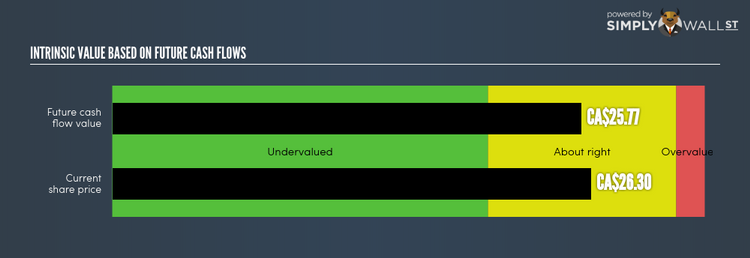Is First National Financial Corporation (TSE:FN) Worth $26.3 Based On Intrinsic Value?

Mortgage and thrift stocks such as FN are hard to value. This is because the rules financial firms face are different to other companies, which can impact the way we forecast their cash flows. For instance, these lenders must hold a certain level of cash reserves on the books as a safety precaution. Examining elements like book values, in addition to the return and cost of equity, is appropriate for gauging FN’s intrinsic value. Below I’ll determine how to value FN in a relatively effective and easy approach. View our latest analysis for First National Financial
What Model Should You Use?
There are two facets to consider: regulation and type of assets. FN operates in Canada which has stringent financial regulations. In addition to this, mortgage and thrift companies tend to not hold significant amounts of physical assets on their balance sheet. While traditional DCF models emphasize on inputs such as capital expenditure and depreciation, which is less useful for a financial stock, the Excess Return model focuses on book values and stable earnings.
Deriving FN’s Intrinsic Value
The central belief for Excess Returns is that equity value is how much the firm can earn, over and above its cost of equity, given the level of equity it has in the company at the moment. The returns above the cost of equity is known as excess returns:
Excess Return Per Share = (Stable Return On Equity – Cost Of Equity) (Book Value Of Equity Per Share)
= (38.34% – 12.58%) * CA$7.44 = CA$1.92
We use this value to calculate the terminal value of the company, which is how much we expect the company to continue to earn every year, forever. This is a common component of discounted cash flow models:
Terminal Value Per Share = Excess Return Per Share / (Cost of Equity – Expected Growth Rate)
= CA$1.92 / (12.58% – 2.13%) = CA$18.33
Putting this all together, we get the value of FN’s share:
Value Per Share = Book Value of Equity Per Share + Terminal Value Per Share
= CA$7.44 + CA$18.33 = CA$25.77
Relative to the present share price of CA$26.3, FN is , at this time, trading in-line with its true value. This means FN isn’t an attractive buy right now. Pricing is only one aspect when you’re looking at whether to buy or sell FN. Analyzing fundamental factors are equally important when it comes to determining if FN has a place in your holdings.
Next Steps:
For mortgage and thrift companies, there are three key aspects you should look at:
Financial health: Does it have a healthy balance sheet? Take a look at our free bank analysis with six simple checks on things like bad loans and customer deposits.
Future earnings: What does the market think of FN going forward? Our analyst growth expectation chart helps visualize FN’s growth potential over the upcoming years.
Dividends: Most people buy financial stocks for their healthy and stable dividends. Check out whether FN is a dividend Rockstar with our historical and future dividend analysis.
For more details and sources, take a look at our full calculation on FN here.
To help readers see pass the short term volatility of the financial market, we aim to bring you a long-term focused research analysis purely driven by fundamental data. Note that our analysis does not factor in the latest price sensitive company announcements.
The author is an independent contributor and at the time of publication had no position in the stocks mentioned.

